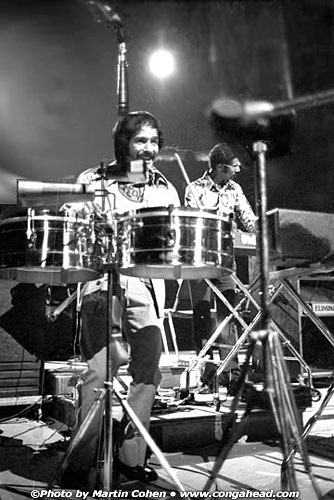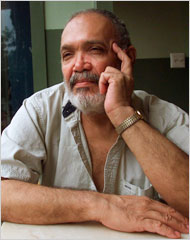Little Ray Romero:
Master Rumbero
June 18, 1923 – August 16, 2006
A percussionists’ percussionist, this master rumbero lived a life of music spanning more than six decades. Born Hernan Romero in Ponce, Puerto Rico on June 18, 1923, Little Ray played with legendary bandleaders and musicians in both the Latin music and American music scene. His percussion solos have become standard rhythmic patterns for young percussionists today. Little Ray passed away peacefully in Florida surrounded by his family on Wednesday, August 16, 2006 at 10 p.m.
Kicking off his career in the late 30s with Puerto Rico’s leading songstress, Ruth Fernandez, Little Ray began playing bongos before picking up the congas. His conga playing was influenced by Chano Pozo whom he met while Chano was performing with Dizzy Gillespie. During the 40s, Little Ray performed with the legendary Xavier Cugat Ochestra before joining the U.S. Army. After his army tour, he played with Noro Morales, Joe Locco, Jose Curbelo, and Miguelito Valdes. By the 50s, he was performing in Puerto Rico and composed part of the percussion section for Cortijo y su Combo when the great Puerto Rican percussionist Rafael Cortijo organized his first band in the early ‘50s.
He went on to become an essential part of the legendary percussion section organized and fronted by Tito Rodríguez. However, he was noticed by Eartha Kitt and recruited to play with her orchestra from 1952 to 1956.
Little Ray Romero went on to back up Sammy Davis, Jr. and Dean Martin. By the late 60s and early 70s, Little Ray could be heard with the orchestras of Eddie Palmieri (on the Live in Sing Sing recording), Frankie Dante and Orchesta Flamboyan, Ray Baretto (on the Lps: Indestructible, Guarare, The Other Road, & Baretto Live Tomorrow where he plays the bata drums), and Machito just to name a few.
The 80s saw Little Ray give back to the younger generation through education. He taught at the Drummer’s Collective, the Johnny Colon Music School and Boy’s & Girls Harbor Conservatory for the performing Arts.
An exemplary family man, a good musician and a great percussionist are the three things Little Ray Romero embraced in his long road through life.
He was the recipient of the first Living Legends tribute at The Point CDC in the Bronx under the direction of Angel Rodriguez in New York in 1997. On Thursday, October 2nd, 2003 the community in East Harlem that saw Little Ray grow up honored him with a tribute at the Julia de Burgos Cultural Center that was formerly P.S. 107 where Ray went to elementary school. Ray Barretto, Rene Lopez, Jimmy Delgado and many others were present. Little Ray was presented with a proclamation from the City of New York that recognized the many important contributions made to the cultural soul of this nation through the music of Little Ray Romero.
Ray Romero is survived by his wife Lucia Romero, his sister Irma Rosen, his four children Stephanie Soffi, Elaine Romero, Little Ray Romero, Jr., and Isabel Santiago, eight grandchildren and one great-granddaughter.
He will be flown to New York to be viewed in the neighborhood where he was raised in East Harlem known as El Barrio on Sunday, August 20, 2006 at the Ortiz Funeral Home, 141 East 103rd Street
Between Lex. and Park Ave. 212-876-1913 from 2 to 10 p.m.
Elaine Romero who was with her father and prepared him for the transition has asked all who knew Ray to bring the gift of music and that in lieu of flowers, donations to defray the cost of the funeral should be sent to:
Lucia Romero
35 East 10th Street
Brooklyn, NY 11218
Aurora Flores

